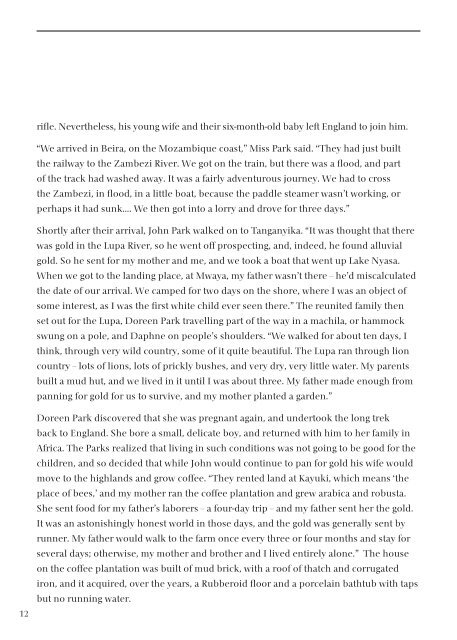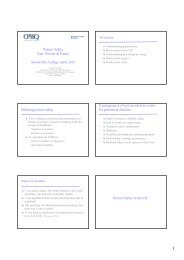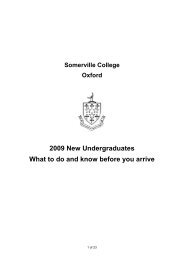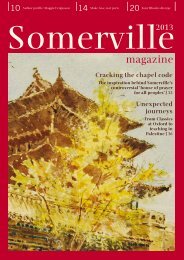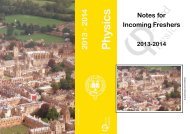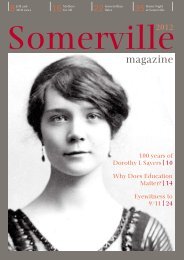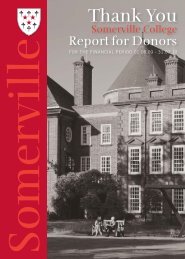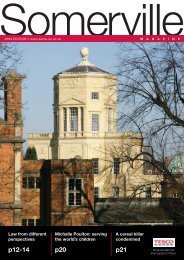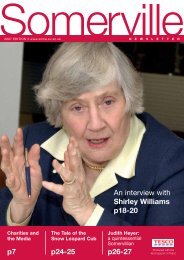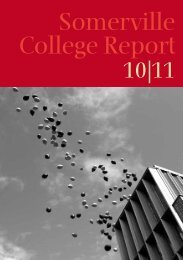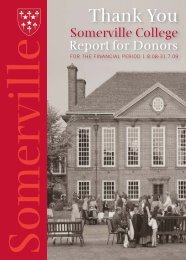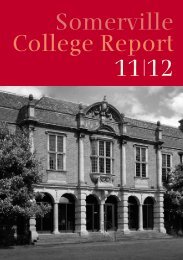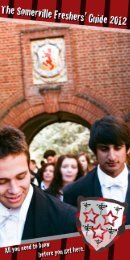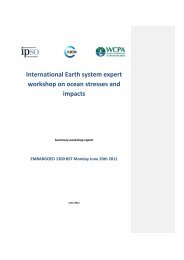Daphne Park Memorial book 3_3.indd - Somerville College
Daphne Park Memorial book 3_3.indd - Somerville College
Daphne Park Memorial book 3_3.indd - Somerville College
Create successful ePaper yourself
Turn your PDF publications into a flip-book with our unique Google optimized e-Paper software.
ifle. Nevertheless, his young wife and their six-month-old baby left England to join him.“We arrived in Beira, on the Mozambique coast,” Miss <strong>Park</strong> said. “They had just builtthe railway to the Zambezi River. We got on the train, but there was a flood, and partof the track had washed away. It was a fairly adventurous journey. We had to crossthe Zambezi, in flood, in a little boat, because the paddle steamer wasn’t working, orperhaps it had sunk…. We then got into a lorry and drove for three days.”Shortly after their arrival, John <strong>Park</strong> walked on to Tanganyika. “It was thought that therewas gold in the Lupa River, so he went off prospecting, and, indeed, he found alluvialgold. So he sent for my mother and me, and we took a boat that went up Lake Nyasa.When we got to the landing place, at Mwaya, my father wasn’t there – he’d miscalculatedthe date of our arrival. We camped for two days on the shore, where I was an object ofsome interest, as I was the first white child ever seen there.” The reunited family thenset out for the Lupa, Doreen <strong>Park</strong> travelling part of the way in a machila, or hammockswung on a pole, and <strong>Daphne</strong> on people’s shoulders. “We walked for about ten days, Ithink, through very wild country, some of it quite beautiful. The Lupa ran through lioncountry – lots of lions, lots of prickly bushes, and very dry, very little water. My parentsbuilt a mud hut, and we lived in it until I was about three. My father made enough frompanning for gold for us to survive, and my mother planted a garden.”Doreen <strong>Park</strong> discovered that she was pregnant again, and undertook the long trekback to England. She bore a small, delicate boy, and returned with him to her family inAfrica. The <strong>Park</strong>s realized that living in such conditions was not going to be good for thechildren, and so decided that while John would continue to pan for gold his wife wouldmove to the highlands and grow coffee. “They rented land at Kayuki, which means ‘theplace of bees,’ and my mother ran the coffee plantation and grew arabica and robusta.She sent food for my father’s laborers – a four-day trip – and my father sent her the gold.It was an astonishingly honest world in those days, and the gold was generally sent byrunner. My father would walk to the farm once every three or four months and stay forseveral days; otherwise, my mother and brother and I lived entirely alone.” The houseon the coffee plantation was built of mud brick, with a roof of thatch and corrugatediron, and it acquired, over the years, a Rubberoid floor and a porcelain bathtub with tapsbut no running water.12


